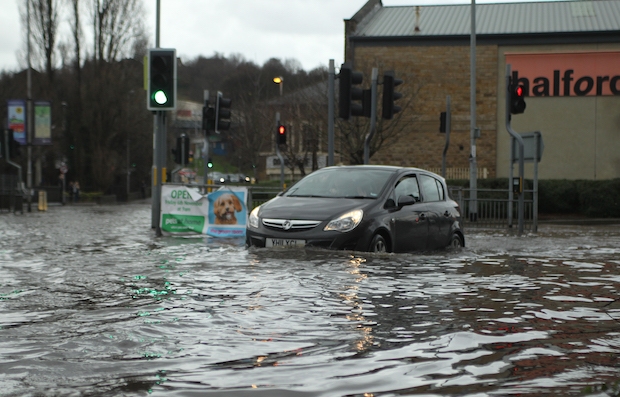The substance of Jeremy Corbyn’s questions today in the Chamber was very good. The Labour leader used enough detail to make David Cameron look uncomfortable on flood spending and which defence schemes were approved and which weren’t. The Prime Minister tried to talk repeatedly about the government increasing money on flood defences and the importance of good economic management, but Corbyn stuck at it, with one particularly good question:
‘In 2011, a £190 million flood defence project in the River Aire in Leeds was cancelled on cost grounds by the government, a thousand homes and businesses in Leeds were flooded in recent weeks, the government is still only committed to a scaled-down version of the project worth a fraction of its total cost when the Prime Minister claimed that money was no object when it came to flood relief. When he meets the Leeds MPs and Judith Blake the leader of Leeds Council in the near future or his Secretary of State does will he guarantee the full scheme will go ahead to protect Leeds from future flooding?’
Cameron replied:
‘Well first of all, let me just make one point before answering in detail his points. It is worth putting on record before we get on to flood defence investment – and I’ll cover it in full – this was the wettest December for over 100 years and actually in Leeds and Yorkshire it was the wettest December ever on record and that’s why rivers, rivers in Yorkshire, including the Aire in Leeds, was a metre higher than it’s ever been in its history. Now in terms of flood defences, no flood defence schemes have been cancelled since 2010, the investment in flood defences was £1.5bn in the last Labour government, £1.7bn in the government I led as a Coalition government and will be over £2bn in this Parliament. It has gone up and up and up and it has gone up because we run an economy where we’re able to invest in the things that our country needs.’
After the session, Cameron’s spokespeople made the slightly gymnastic claim that the Leeds scheme hadn’t been cancelled, but had merely not been adopted. A Number 10 source said ‘the claim is that the scheme had been cancelled: there was no scheme cancelled. There was a proposal made, it wasn’t adopted.’ The Prime Minister’s official spokeswoman also told journalists that the scheme was not adopted because it was ‘deemed unaffordable’. This is the 2011 Commons exchange between Leeds MP Greg Mulholland and the minister responsible:
Greg Mulholland: Given the constraints on the public finances, can my hon. Friend confirm that the criteria for judging the schemes before him include not only the risk but the costs of flooding? In Leeds, which is the second-biggest financial centre in the country, those costs would be £500 million. Do the criteria also include the economic benefits of putting in the flood alleviation scheme? In Leeds, the scheme is supported by all the Leeds MPs because it would attract more development to the city.
Richard Benyon: I am well aware of the concerns of the people of Leeds, which have been well articulated by the Members who represent that city. That scheme is hugely expensive and I do not doubt that it will bring benefits to the city. I am happy to meet Members on both sides of the House to discuss it. We want to work with the local authority and other agencies to find parts of the scheme with which we might proceed sooner than others. It will not go from conception to commissioning in one year because it is such a massive scheme, but we want to bring it forward as quickly as we can. We have to make sure that we have value for taxpayers’ money at the heart of what we are doing so that we can protect as many homes as possible across the country.
Mr George Mudie: I am grateful for those words from the Minister, but is he aware that Leeds city centre came within centimetres of being flooded in 2000, according to Environment Agency information, and that it had numerous near misses in 2004, 2007 and 2008? Will the Minister agree to meet Leeds MPs to discuss this? Leeds is the largest city in the north and we cannot allow it to be knocked out by flooding or to be prioritised below households. It is the major economic centre of west Yorkshire.
Richard Benyon: I absolutely understand that. The hon. Gentleman can come to meet me if he wishes to hear more details about this. The scheme will cost £250,000 or thereabouts per household it protects. That is an enormous amount of money and I do not deny its importance, particularly to the people of Leeds, but we have to look at it from the perspective of the whole area. If it can unlock regeneration or benefits to that city there might be opportunities under the new payment-for-outcomes scheme.
But when Number 10 was repeatedly pressed today by journalists on why only a scaled-back version of the proposed scheme was going ahead and how that was somehow better than the full scheme, there was no answer.
Labour sources repeatedly spoke of ‘millions of people’ caring about the floods and Labour using PMQs to focus on that issue. Corbyn will have given the impression of being more serious and well-briefed on the matter, so why did Cameron try all those jokes about the reshuffle? Well, even though his lengthy Shakespeare joke about ‘Love’s Labour’s Lost’ was rather painful, the overall benefit to the PM was that it would remind voters of how weak an alternative Labour is at the moment. So even if those millions of voters might appreciate Corbyn’s efforts today, they will also have been reminded that his party isn’t in any shape to take over from the Tories.







Comments